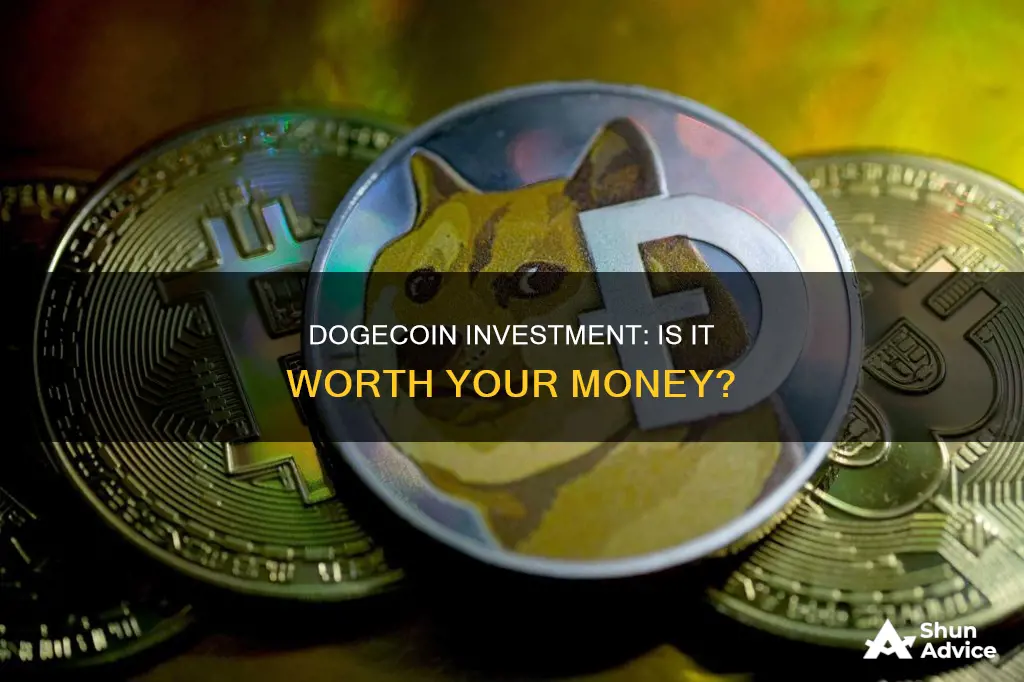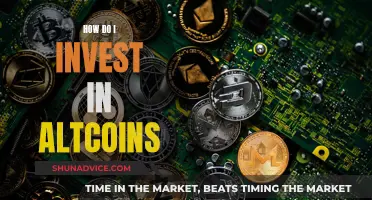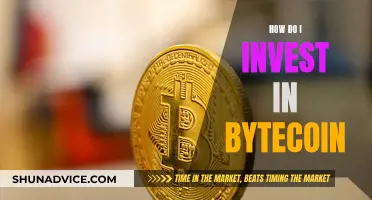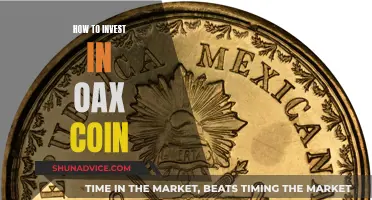
Dogecoin, a cryptocurrency, was created as a joke in 2013, inspired by the Doge meme featuring a Shiba Inu dog. It was founded by former Adobe and IBM software engineers Billy Markus and Jackson Palmer. Despite its humorous origins, Dogecoin has grown into a recognised digital currency with a strong, charitable community. Its value has increased significantly, and it has gained mainstream attention, particularly from high-profile individuals like Elon Musk, Snoop Dogg, and Mark Cuban. However, investing in Dogecoin comes with risks due to its volatile nature and lack of intrinsic value. Before investing, it is crucial to understand the crypto markets and carefully consider how it aligns with your existing investment portfolio.
What You'll Learn

How to buy Dogecoin
Dogecoin is a cryptocurrency that was started as a joke in 2013. Its name comes from a Shiba Inu dog meme. Despite its humorous start, Dogecoin has grown into a recognised digital currency with a strong, charitable community.
Here's how to buy Dogecoin in four simple steps:
- Create an account: The first step to buying Dogecoin is to open an account with a reputable cryptocurrency exchange where you can buy, sell and trade Dogecoin. Some popular exchanges that support Dogecoin include Coinbase, eToro, Robinhood, Uphold, Webull, and Kraken. You will be asked to provide personal information and verify your identity. The verification process usually takes a few days.
- Deposit funds into your account: Once your account is verified, you will need to fund your account. This can be done through a wire transfer, ACH transfer, or credit/debit card, depending on the rules and regulations in your area.
- Buy Dogecoin: Open the trading platform of your chosen crypto exchange, check the current price of Dogecoin, and place a buy order at a suitable price. The price of cryptocurrencies is always changing, so you may want to track the price of Dogecoin over time to ensure you don't overpay for your coins.
- Move Dogecoin to your wallet: After purchasing Dogecoin, you will want to move it from the exchange to your crypto wallet, where you can store your crypto securely and reduce the risk of hacking. To do this, simply supply your wallet address to get your coins out of the exchange.
It is important to remember that investing in cryptocurrency is risky, and Dogecoin is a highly volatile cryptocurrency with no intrinsic value.
Investing in Bitcoin: Is It Worth Putting $1000 in Crypto?
You may want to see also

Dogecoin's value and volatility
Dogecoin's value has fluctuated significantly over the years. In 2021, it experienced a surge in value, partly due to supportive tweets from Elon Musk, and its price rose to around 46p per coin, with a market value of approximately £60 billion. This was a remarkable increase, considering it started the year at just one cent. Despite this surge, Dogecoin's value has generally declined since 2021, and as of August 2024, its price is around $0.10-$0.15 USD.
Dogecoin's volatility is a key factor influencing its value. Volatility refers to the rate at which a cryptocurrency's price changes over time. Dogecoin is known for its high volatility, which means its price can fluctuate rapidly and unpredictably. This volatility can present both opportunities and risks for investors. On the one hand, high volatility can indicate the potential for significant price movements, providing chances for investors to make profits. On the other hand, it also increases the risk of losses, as prices can drop suddenly and significantly.
Compared to other cryptocurrencies like Bitcoin, Dogecoin has exhibited lower volatility in certain periods. For example, in September 2023, Dogecoin had a lower annualised 30-day realised volatility of 30% compared to Bitcoin's 35%. This shift may be attributed to a lack of investor interest in alternative cryptocurrencies and the increasing dominance of Bitcoin in the crypto market.
Dogecoin's unlimited supply also impacts its volatility and value. Unlike many other cryptocurrencies with a capped supply, Dogecoin has no supply limit. This decision was made to maintain incentives for miners and low transaction fees. However, it also means that Dogecoin is inflationary by design, which can affect its perceived value as a store of value.
In summary, Dogecoin's value and volatility are closely linked. Its high volatility can make it a risky investment, but it also presents opportunities for investors comfortable with managing market fluctuations. Dogecoin's value has experienced significant highs and lows, and its future remains uncertain. Therefore, investors should carefully consider the risks and educate themselves about the crypto markets before investing in Dogecoin.
Strategies to Avoid Fees When Investing with Bitcoin
You may want to see also

Dogecoin vs other cryptocurrencies
Dogecoin is a cryptocurrency that was created as a joke in 2013, inspired by the "Doge" meme featuring a Shiba Inu. It was designed to be a more light-hearted and accessible alternative to Bitcoin. With no supply limit, it is used for small transactions and online tipping. Despite its humorous origins, Dogecoin has grown into a recognised digital currency with a strong, charitable community.
Dogecoin vs. Bitcoin
Dogecoin and Bitcoin are both cryptocurrencies built using blockchain technology, but they have several key differences. Firstly, Bitcoin is far more influential and established than Dogecoin, with a market value around 12 times larger. Secondly, Bitcoin has a hard limit of 21 million coins, whereas Dogecoin has an unlimited supply, with 5 billion new coins created every year. This unlimited supply means that Dogecoin is not seen as a good store of value, and its inflationary design can be off-putting to investors.
Another difference is in their transaction speeds and fees. Dogecoin has faster transaction processing times, with a block time of 1 minute, compared to Bitcoin's 10-minute block confirmation time. This makes Dogecoin more attractive for microtransactions and online tipping. However, Bitcoin's average transaction fees are higher, at around $1.543, while Dogecoin's average transaction fee is approximately $0.24.
In terms of security, both Dogecoin and Bitcoin use a proof-of-work (PoW) consensus mechanism, which requires miners to solve complex mathematical problems to validate transactions and secure the network. Dogecoin originally employed the Scrypt algorithm, which was less memory-intensive, but it has since adopted Auxiliary Proof of Work (AuxPoW), allowing it to be merge-mined with Litecoin and increasing its security.
Dogecoin vs. Ethereum
Ethereum is another popular cryptocurrency, currently ranked second after Bitcoin in terms of market capitalisation. It is a blockchain technology that has facilitated the development of decentralised finance (DeFi) and non-fungible tokens (NFTs). Ethereum has a strong support base, with thousands of validators worldwide, ensuring its decentralisation and constant availability.
One of the key differences between Dogecoin and Ethereum is their consensus mechanisms. While Dogecoin uses the PoW algorithm, Ethereum is in the process of shifting to a proof-of-stake (PoS) consensus mechanism, which is more efficient and secure. Additionally, Ethereum has higher transaction fees, known as "gas fees", which have been a cause for concern, especially for smaller transactions.
Dogecoin vs. Cardano, Litecoin, and Shiba Inu
Dogecoin also differs from other cryptocurrencies like Cardano, Litecoin, and Shiba Inu. Cardano, for example, offers smart contract functionality and uses a proof-of-stake consensus mechanism, while Litecoin is similar to Bitcoin in terms of its limited supply and higher transaction fees. Shiba Inu, on the other hand, is a more recent "meme coin" that has gained popularity but lacks a clear use case.
Dogecoin stands out among cryptocurrencies due to its light-hearted origins and strong community. However, its unlimited supply and lack of real-life use cases may be seen as disadvantages when compared to other cryptocurrencies. Ultimately, the decision to invest in Dogecoin or any other cryptocurrency depends on individual preferences, risk tolerance, and trading strategies.
Islamic Investing: Is Bitcoin Halal or Haram?
You may want to see also

Dogecoin's future
Dogecoin has no supply limit, and its price is highly volatile. It is also difficult to spend Dogecoin in the real world. These factors make it a risky investment. Its value is based on speculation and social media hype, particularly from high-profile individuals like Elon Musk, Snoop Dogg, and Mark Cuban.
Dogecoin's development team and community are working on improving the network's efficiency, security, and scalability. However, given that the coin doesn't seem to have any practical use, it's hard to envision it having a lasting future. Dogecoin is extremely volatile, and its price could come crashing down any day. Therefore, investing in Dogecoin is more like gambling than a traditional investment.
Bitcoin Investment: Late to the Party or Still Profitable?
You may want to see also

Dogecoin's creators
Dogecoin was created by software engineers Billy Markus and Jackson Palmer in 2013. Markus and Palmer intended the project to be a light-hearted alternative to Bitcoin, inspired by the "Doge" meme featuring a Shiba Inu dog.
Markus and Palmer met while working at Adobe and IBM, respectively, and set out to create a cryptocurrency that parodied the then-emerging trend of minting altcoins with little value beyond novelty symbolism. Dogecoin was built on similar technology to Bitcoin but offered faster and more affordable transactions.
Markus and Palmer's creation quickly gained a following and became a popular cryptocurrency in its own right. The Dogecoin community is known for its friendly and welcoming ethos, with users employing the currency for charitable acts and microtransactions.
Despite the success of their project, both creators have since distanced themselves from the cryptocurrency world. Palmer left the Dogecoin project in 2015 and has become a vocal critic of the industry, expressing concerns about its right-wing, hyper-capitalistic nature, and the potential for it to cause harm to those from lower socioeconomic backgrounds. Markus, meanwhile, quit the project several months after its launch and has not invested in crypto since, apart from buying some Ether. He also prefers to avoid publicity and communicates with crypto fans solely via social media.
Bitcoin Halal or Haram? Islamic Finance Experts Weigh In
You may want to see also
Frequently asked questions
Dogecoin is a cryptocurrency that was started as a joke in 2013. Its name comes from a Shiba Inu dog meme.
You can buy Dogecoin by opening an account with trusted crypto exchanges such as eToro, Robinhood, Coinbase, Uphold, Webull, Kraken, and Crypto.com.
Dogecoin is extremely volatile and is considered a risky investment. Its value is based on speculation and it has no practical use. However, it has a strong community and a loyal user base.
As of August 2024, Dogecoin is worth around $0.10-0.15 USD. It hit a high of $0.70 in May 2021.
Dogecoin's future is uncertain. It doesn't seem to have any practical use and there is no cap on the number of Dogecoins that can be mined. The price is driven by social media hype and it is hard to envision it having a lasting future.







